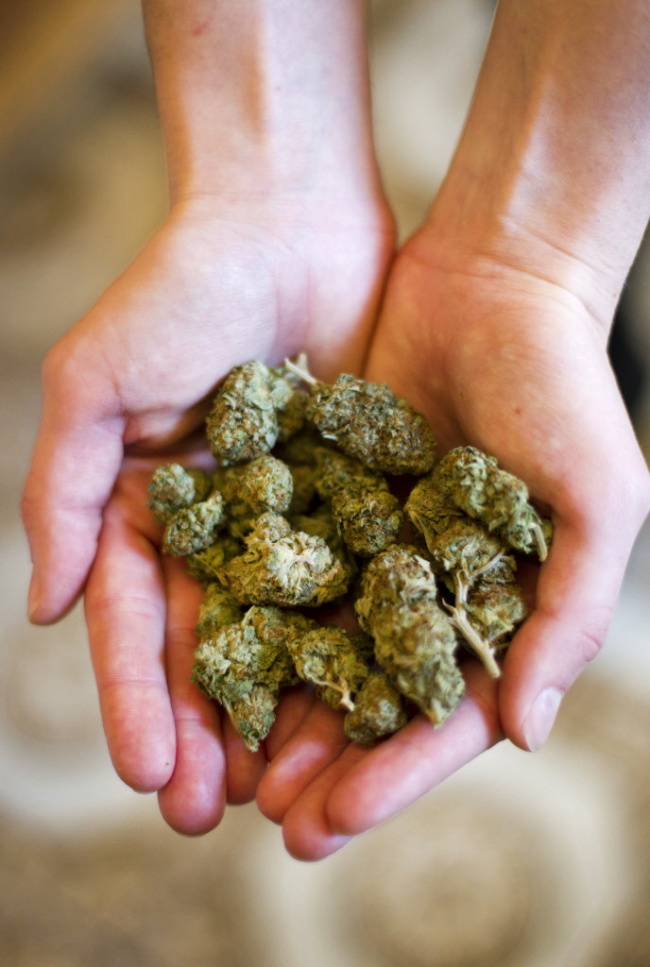Uruguay’s move to legalize pot faces uncertain future
By Korea HeraldPublished : Oct. 19, 2014 - 21:01
MONTEVIDEO (AFP) ― Uruguay’s landmark law legalizing marijuana sales has gotten off to a rocky start and may not survive upcoming elections to replace the man behind it, leftist President Jose Mujica.
Under the law, the first of its kind in the world, marijuana users were supposed to be able to choose a supply source ― pharmacies, cannabis clubs or homegrown plants ― and buy or grow the drug in a regulated, fully legalized market.
Under the law, the first of its kind in the world, marijuana users were supposed to be able to choose a supply source ― pharmacies, cannabis clubs or homegrown plants ― and buy or grow the drug in a regulated, fully legalized market.

But though the legislation officially came on the books in April, implementation is still in the embryonic stages.
And Mujica, a folksy iconoclast known for living in a run-down house and giving most of his salary to charity, is barred from reelection under Uruguay’s term limits.
The law’s future looks uncertain in the hands of the top candidates vying to replace him.
The front-runner, Mujica’s predecessor and Broad Front party colleague, cancer doctor Tabare Vazquez, made strict antismoking legislation one of the top priorities of his own presidency, and has been luke-warm toward his successor’s key policy initiative.
His main opponent, Luis Lacalle Pou of the center-right National Party, has meanwhile been outright hostile toward it.
With time ticking down on Mujica’s term, which ends in January, basic nuts and bolts of the law are still not in place.
One of the legislation’s key components is a national registry of marijuana users to ensure that buyers have fulfilled the licensing procedures and do not exceed the monthly maximum purchase of 40 grams.
But so far registration has only been opened for those who grow their own plants.
Just 378 people in the country of 3.3 million had signed up as of Sept. 11, according to the newly launched Institute for the Regulation and Control of Cannabis.
No date has been set to register those who want to buy pot at the pharmacy ― a component whose implementation has been postponed from this year to next ― or through cannabis clubs.
Nor is there a date for the state-supervised marijuana fields the law was supposed to create.
“Given that there are several thousand marijuana growers in the country, 400 in one month is a low number,” said Juan Manuel Varela, co-owner of Urugrow, a boutique in the capital Montevideo that caters to those who grow marijuana at home.
The government estimates there are 150,000 regular marijuana users in the country.
But many appear wary of the new law, which leaves certain gray areas.
For example, private growing is allowed, but no mechanism to buy seeds has been created.
“The regulations aren’t very logical,” said Varela.
“There’s a lack of information.”
And many are fearful of the new registry.
“You can consume alcohol or tobacco without registering,” said Varela.
“If I register, they come to my house. If I don’t register, they don’t come. So why register?”
“The registry is an enormous risk for the future,” said sociologist Rafael Bayce, a proponent of the law.
“A lot of people could be pursued by the authorities if the next government is against the legislation.”
Candidates’ “absurd” statements on the law are making matters worse, he said.
Vazquez, the favorite heading into the first-round election, recently said that thanks to the marijuana users registry ― which is supposed to be anonymous ― the government “will better know who uses drugs and be able to intervene earlier to rehabilitate that person.”
Lacalle Pou for his part has vowed to repeal the law if elected.
“The implementation and evaluation (of the law) will fall to the next government, which will be less favorable than the current one,” said Bayce.
“I’m very afraid for the future of this law.”
-
Articles by Korea Herald









![[Hello India] Hyundai Motor vows to boost 'clean mobility' in India](http://res.heraldm.com/phpwas/restmb_idxmake.php?idx=644&simg=/content/image/2024/04/25/20240425050672_0.jpg&u=)









